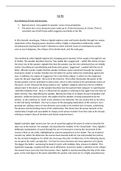Eat Me
Key elements of form and structure:
Rigid structure- inescapable for speaker, sense of claustrophobia.
The poem has a very strong structure made up of 10 tercets (stanzas of 3 lines). There is
consistent use of half rhyme which suggests uncertainty in her life.
In this dramatic monologue, Patience Agbabi explores male and female identity through her unique
exploration of the changing power dynamics within a highly co-dependent relationship, whilst
simultaneously drawing the reader’s attention to other eminent issues of contemporary society,
such as over-indulgence, the critique of the female body, and the male gaze.
One method by which Agbabi explores the changing power dynamic of the couple is through her use
of similes. The speaker describes how her ‘hips judder like a juggernaut’ – whilst this clearly conveys
the sheer size of the speaker, Agbabi hints that the speaker may be more dominant than we initially
realise. Describing an overwhelming and destructive power, ‘juggernaut’, coupled with the use of
bitter, affricate sounds, implies that the speaker harbours some resentment towards her partner,
leaving the reader to wonder whether she will utilise her power within the relationship against the
man. In addition, the origins of ‘juggernaut’ lie in the Hindu religion, in which it is the Anglicized
name for the god ‘Jagannath’, the Lord of the Universe. This further illuminates the power of the
female speaker and her potential for destruction, which is fully realised in the penultimate stanza of
the poem, as she ‘drowned his dying sentence out’. Agbabi’s religious reference mirrors a biblical
allusion later in the poem, as the speaker describes how her partner finds ‘pleasure’ in watching her
‘swell like forbidden fruit’. Here, it is likely that the speaker is referring to the apple from the Story of
Adam and Eve, thus objectifying the speaker, likening her body to an object of pure temptation and
pleasure. Unlike the previous simile, this implies that the speaker is being overpowered by her
partner, as she continues to ‘swell’ as she submits to his demands. We can assume that as he refers
to the fruit being ‘forbidden’, the man is aware of the damaging implications of the woman’s ever-
growing size, adding a sense of mercilessness and cruelty to his evident love of excess, underlining
the abusive and dominating nature of the relationship. This shows how the power dynamic in the
relationship is fragile and susceptible to change as the power transfers from the male to the female,
relating to modern ideas of feminism and female empowerment.
Agbabi maintains tight control over her use of sound throughout the poem in order to describe the
utter size of the woman. For example, she describes the ‘wobble’ of her ‘broad belly’. Here, Agbabi’s
deliberate manipulation of sound through the use of consonance conveys the movement of the
woman’s flesh as she walks, highlighting her extreme proportions to the reader. The use of plosive
sounds may reflect the bitterness the woman feels towards both her size and possibly her partner
for his constant indulgence, for which she must spay the price. Furthermore, in the following stanza,
we are given the male’s perspective – his love for excess becomes yet more apparent as he gloats
‘the bigger the better’, expressing his desire for girls ‘with multiple chins, masses of cellulite’. This
hyperbolic language, coupled with the use of alliteration, draws the reader’s attention to the critique
the woman faces every day from her partner. Here, Agbabi is clearly presenting the idea of the male
gaze, as the male figure in the poem objectifies his partner and views her in a highly sexualised way




